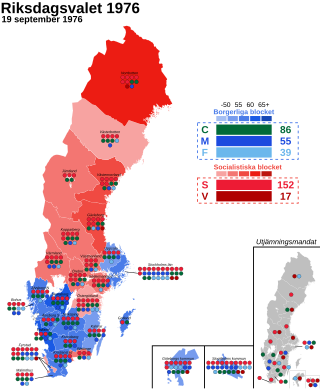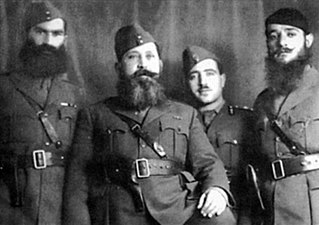
The Hungarian Workers' Party is a communist party in Hungary led by Gyula Thürmer. Established after the fall of the communist Hungarian People's Republic, the party has yet to win a seat in the Hungarian parliament. Until May 2009, it was a member of the Party of the European Left. It was formed from, and considers itself the successor to, the former ruling Hungarian Socialist Workers' Party.

A referendum on the Treaty establishing a Constitution for Europe was held in Spain on Sunday, 20 February 2005. The question asked was "Do you approve of the Treaty establishing a Constitution for Europe?". The consultative referendum on ratification of the proposed Constitution for the European Union was approved by 81.8% of valid votes, although turnout was just 41.8%, the lowest since the end of the Franco era.

General elections were held in Sweden on 19 September 1976. Although the Swedish Social Democratic Party remained the largest party, winning 152 of the 349 seats in the Riksdag, a coalition government was formed with the Centre Party, the People's Party and the conservative Moderate Party, which formed Sweden's first non-socialist government since 1936. Centre Party leader Thorbjörn Fälldin, who had widely been expected to take over the government in the previous election of 1973, was appointed Prime Minister, the first not from the Swedish Social Democratic Party since Axel Pehrsson-Bramstorp's brief interregnum 40 years earlier.

General elections were held in Sweden on 16 September 1979. Although the Swedish Social Democratic Party remained the largest party, winning 154 of the 349 seats in the Riksdag, the liberal interim government of Ola Ullsten was succeeded by another centre-right coalition government composed of the People's Party, the Moderate Party and the Centre Party, led by Centre Party leader Thorbjörn Fälldin. The three parties together won 175 seats, compared to the 174 won by the Social Democrats and Communists. It was the only time that non-socialist parties retained power in an election between 1928 and 2010. The Moderates dramatically increased their representation in the Riksdag, becoming the largest party of the non-socialist bloc, a position they maintained until 2022.

General elections were held in Sweden on 15 September 1985. The Swedish Social Democratic Party remained the largest party in the Riksdag, winning 159 of the 349 seats. Its leader, Olof Palme, kept his position as Prime Minister. He would retain this position successfully until his assassination in 1986.

Parliamentary elections were held in Greece on 31 March 1946. The result was a victory for the United Alignment of Nationalists, an alliance that included the People's Party, the National Liberal Party, and the Reform Party, which won 206 of the 354 seats in Parliament. As a result Konstantinos Tsaldaris became Prime Minister leading a right-wing coalition. Nonetheless, he soon decided to resign in favor of Themistoklis Sophoulis, who led a government of national unity during the entire second phase of the civil war (1946–1949). One of the priorities of the new government was the proclamation of a plebiscite for the restoration of the Greek monarchy.

Parliamentary elections were held in Slovakia on 17 June 2006. Direction – Social Democracy emerged as the largest party in the National Council, winning 50 of the 150 seats. Its leader Robert Fico was appointed Prime Minister on 4 July 2006, leading a three-party centre-left populist coalition.

General elections were held in Malta on 22 February 1992. The Nationalist Party remained the largest party, winning 34 of the 65 seats.

General elections were held in Malta on 9 May 1987. Although the Nationalist Party received the most votes, the Malta Labour Party won a majority of seats. However, in accordance with the modifications made to the electoral system following a similar outcome in the 1981 elections, the Nationalist Party was awarded an extra four seats in order to give them a parliamentary majority.

General elections were held in Malta on 12 December 1981.

General elections were held in Malta between 26 and 28 March 1966. The Nationalist Party remained the largest party, winning 28 of the 50 seats.

General elections were held in Malta on 8 March 2008 to elect all members of the House of Representatives They were held alongside local elections.

A referendum on European Union membership was held in Malta on 8 March 2003. The result was 54% in favour. The subsequent April 2003 general elections were won by the Nationalist Party, which was in favour of EU membership, the opposition Labour Party having opposed joining. Malta joined the EU on 1 May 2004.

General elections were held in Malta between 17 and 19 February 1962. The Nationalist Party emerged as the largest party, winning 25 of the 50 seats.

General elections were held in Malta between 12 and 14 December 1953. The Malta Labour Party emerged as the largest party, winning 19 of the 40 seats. However, the Nationalist Party formed a government with the Malta Workers Party on 9 January 1954 with Giorgio Borġ Olivier continuing as Prime Minister.

General elections were held in Malta between 2 and 4 September 1950. Following the Labour Party splitting into the Malta Labour Party and the Malta Workers Party, the Nationalist Party emerged as the largest party, winning 12 of the 40 seats.
Parliamentary elections were held in Hungary on 25 and 26 January 1920. However, they were only held in 164 districts. After the Treaty of Trianon was signed, the 44 districts previously occupied by Romania voted between 13 June and 5 July, whilst the 11 districts occupied by Serbia did not vote until 30 and 31 October 1921. The election was held with compulsory voting. In protest at this and other changes to the franchise that left 60% of the voting age population unable to vote, the Hungarian Social Democratic Party boycotted the elections, and called for its supporters to cast invalid votes, resulting in an unusually high number of blank or invalid votes – 12% in the January elections and over 20% in Budapest and other major cities.

General elections were held in Malta between 7 and 9 August 1927. Although the Nationalist Party received the most votes, the Constitutional Party emerged as the largest party, winning 15 of the 32 seats in the Legislative Assembly. The Nationalist Party remained the largest party in the Senate with four of the seven elected seats.

General elections were held in Malta between 11 and 13 June 1932. The Nationalist Party emerged as the largest party, winning 21 of the 32 seats in the Legislative Assembly and five of the seven elected seats in the Senate.
The next general election will be held in Malta by 2027 to elect all members of the House of Representatives. The Labour Party, which had governed Malta since 2013, won a third term in the 2022 election under Robert Abela. Shortly after the election, Bernard Grech was re-elected unopposed for the leader of the Nationalist Party.









